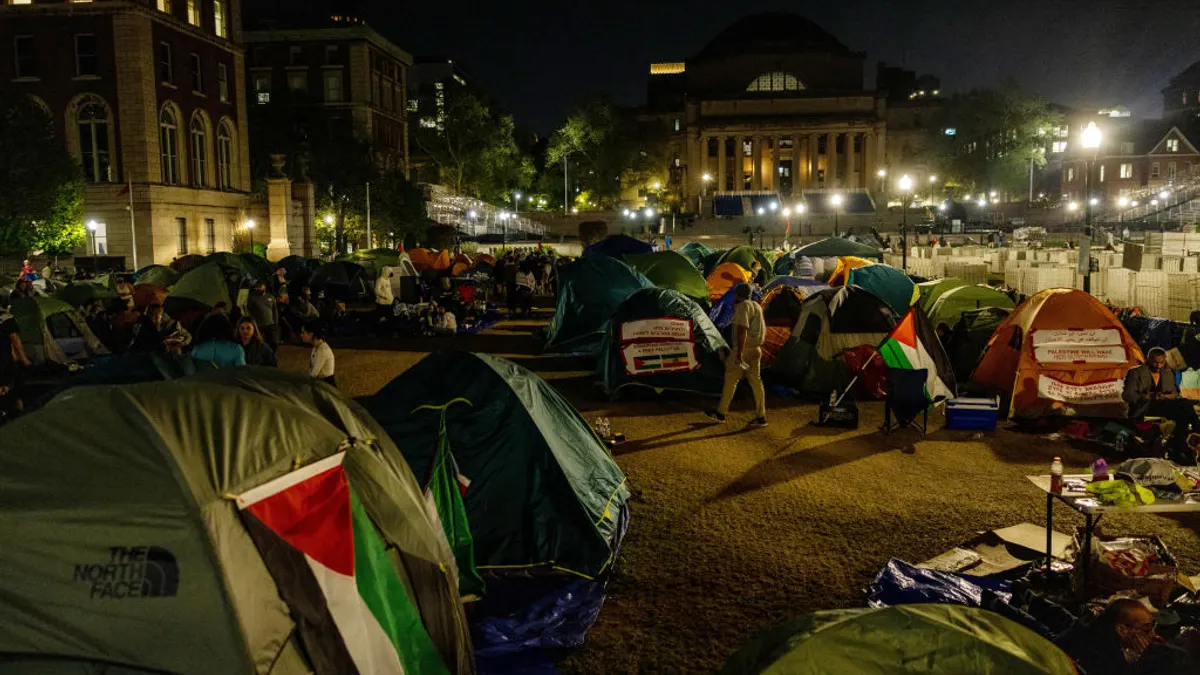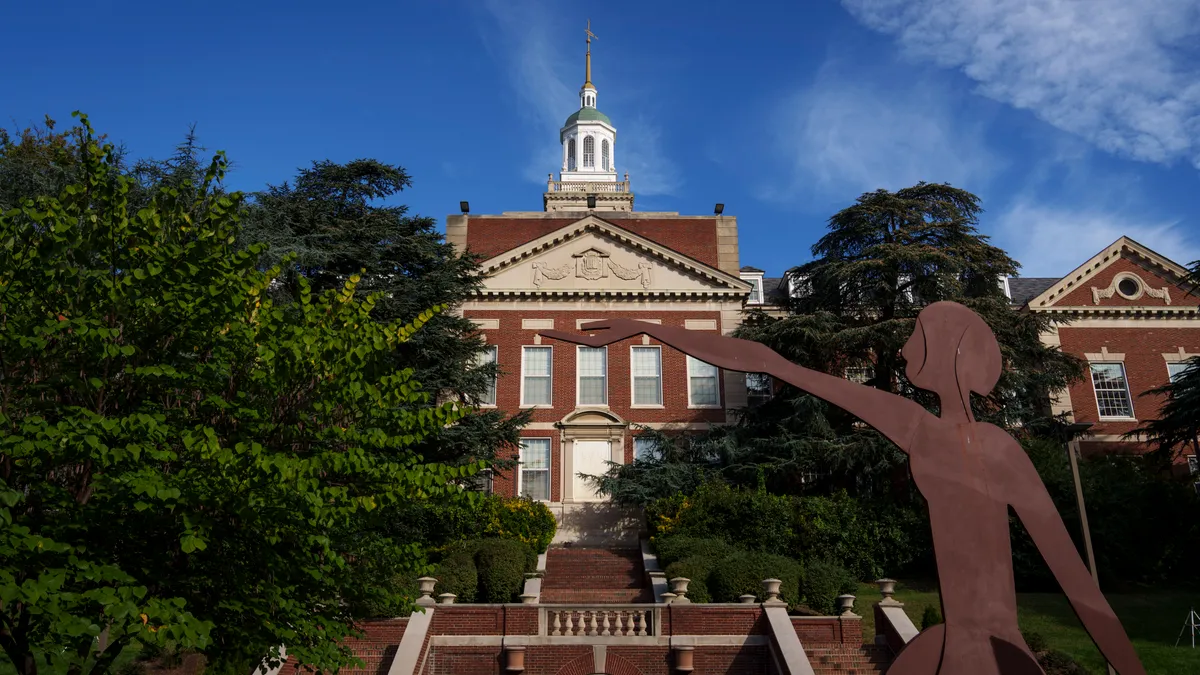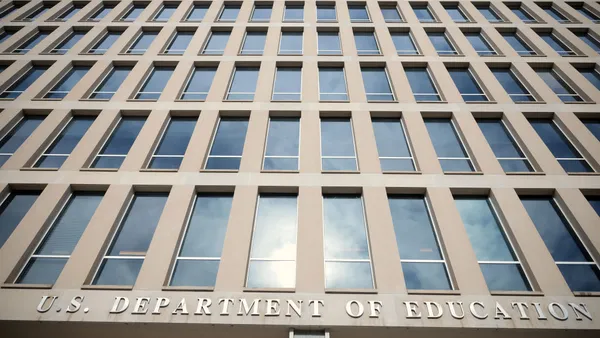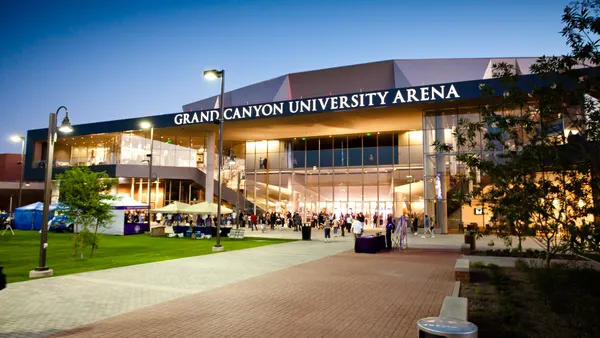Dive Brief:
- Fifty people have been charged in an alleged nationwide conspiracy to exploit an admissions pathway designed for student athletes in order to buy access to elite institutions, the Justice Department announced Tuesday.
- Among those charged are 33 parents, including several high-profile executives, actresses, business owners, a lawyer and a fashion designer, as well as several college athletics coaches and at least one athletics director. Two test administrators were also charged. Students and the universities were not charged, The New York Times reported.
- Parents paid a California college prep firm to raise students' standardized test scores, create fake athletics profiles and pay off coaches to slot the students as recruits — all but ensuring their admission. The firm's head received about $25 million from parents between 2011 and February 2019 to "bribe coaches and university administrators," which he said opened a "side door" to elite colleges.
Dive Insight:
The indictment swept through the mainstream media like a hurricane on Tuesday — what with the cinematic cocktail of fabulously wealthy parents, the pull of exclusive universities, the sometimes-warped world of college athletics, hefty bribes and unsubtle efforts to game college entrance exams. Perhaps seeing the irony, the feds even called it "Operation Varsity Blues."
All this happened at a time when many institutions are responding to market pressure to stem tuition increases and offer bigger discounts to low- and middle-income students.
In addition to the $25 million for bribes, parents generally paid the admissions company between $15,000 and $75,000 per college entrance exam to either have someone take the tests in place of their children or change their answers after, according to court documents. The amounts were typically paid through a nonprofit set up to receive them as tax-free donations.
While certainly extreme, the parents' methods are "manifestations of a common desperation," Joe Pinsker wrote for The Atlantic. Affluent parents can afford to send their kids to good colleges, and so face the pressure to do so. And in many fields, having attended more selective institutions can open doors that lead to higher lifetime earnings, though Pinkser noted research shows that may not always be the case.
That brings up higher ed's fraught relationship with rankings. More institutions (and industry observers) eschew them as they seek to diversify their value proposition away from selectivity, yet many continue to tout their spot on lists such as U.S. News & World Report's. And prospective students and their families still see them as reliable guides.
The colleges involved in this scandal are highly ranked: The Justice Department named coaches from Georgetown University, Stanford University, the University of Southern California, the University of California Los Angeles, Wake Forest and Yale.
In response to the news, some expressed less in the way of surprise than of affirmation that obtaining entry to elite institutions often comes at great expense in the way of supports such as tutors, test prep and college consultants that some parents can afford and others can't.
In this case, parents paid to get their children placed on lists of recruited athletes — who are typically held to lower academic standards in exchange for the contribution of their athletic abilities — and could therefore more easily fly under the radar of admissions officers. The company fixing the deals went so far as to create fake profiles documenting the prospective students' athletic achievements.
Some colleges, like Stanford, have said they'll stop trading on selectivity during enrollment season. Many are making moves to equalize admissions by using the Common Application and removing requirements for standardized tests. And the U.S. News ranking has incorporated access-oriented indicators such as social mobility and graduation rates of Pell Grant recipients. More broadly, a debate over how elite institutions select and diversify their incoming classes is underway with several challenges to affirmative action.
Whether this scandal forces a larger discussion of access and equity at elite institutions is to be determined.
Last thought for today: elite colleges have been under attack from right (affirmative action) and left (equity/price) for some time now. Is today's scandal too much....is it a turning point to blow up the admissions system and start anew? I hope so, but probably not. Good night.
— Jeff Selingo (@jselingo) March 13, 2019











